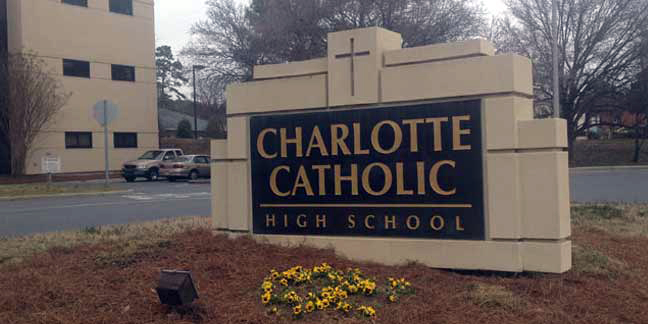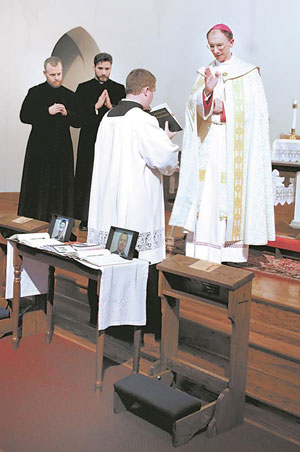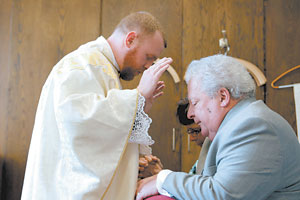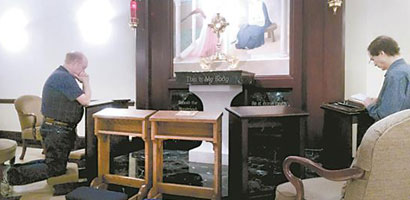 CHARLOTTE — A former substitute teacher is suing the Diocese of Charlotte, the Mecklenburg Area Catholic Schools system, and Charlotte Catholic High School, claiming that his civil rights were violated when the high school decided to stop calling him for substitute teaching work.
CHARLOTTE — A former substitute teacher is suing the Diocese of Charlotte, the Mecklenburg Area Catholic Schools system, and Charlotte Catholic High School, claiming that his civil rights were violated when the high school decided to stop calling him for substitute teaching work.
Lonnie H. Billard, a retired drama teacher at the high school, claims in a federal lawsuit that he was removed from the school’s list of substitute teachers in late 2014 after he announced plans to marry his male partner.
The federal lawsuit argues that the school’s decision violates Title VII of the Civil Rights Act of 1964, which prohibits employers from discriminating against employees on the basis of sex, race, color, national origin and religion.
The lawsuit was filed Jan. 11 in the U.S. District Court for the Western District of North Carolina on Billard’s behalf by the North Carolina affiliate of the American Civil Liberties Union and the Charlotte-based law firm Tin Fulton Walker & Owen. It contends that Billard was unlawfully discriminated against because of his sexual orientation, his intended same-sex marriage, and “because he does not conform to sex-based stereotypes associated with men in our society.”
In a statement issued Jan. 11, Billard’s attorney said the school’s action was discriminatory. “Lonnie was fired because he announced his marriage to his longtime partner, who is a man, and that is sex discrimination, pure and simple,” said Chris Brook, legal director for the ACLU of North Carolina.
According to the lawsuit, Billard is asking for an unspecified amount of back pay and benefits, compensation for “emotional distress,” punitive damages, and an order blocking the diocese and its school system from “further discriminatory conduct.”
“The Diocese of Charlotte does not typically discuss ongoing litigation,” David Hains, diocesan communication director, said Jan. 13.
Billard retired after 11 years from his teaching job at Charlotte Catholic High School in 2012, not long after he was named Teacher of the Year.
He continued working at the high school as an occasional substitute teacher for the next two years, for a total of about 36 weeks, according to the lawsuit.
In October 2014, Billard announced on Facebook that he and his male partner were planning to get married the next May.
All employees of the diocese agree upon their employment to follow the diocese’s ethics policy and a personnel policy that requires them to conduct themselves in a manner consistent with the teachings of the Catholic Church. Catholic teaching holds that marriage can only be the union of one man and one woman.
According to the diocese’s human resources office, substitute teachers are classified as temporary employees. They have no benefits but they are subject to the same policies as other employees.
Billard’s lawsuit comes after he was unsuccessful in pursuing a discrimination complaint with the federal Equal Employment Opportunity Commission in May 2015.
The EEOC investigated the complaint but decided not to pursue the case.
At Billard’s request in November 2016, the EEOC gave him a “notice of right to sue,” telling Billard that he had the right to file a lawsuit in federal court, but only within the next 90 days.
— Catholic News Herald
Charlotte Catholic: Retired teacher can't work now as substitute after he announces gay 'marriage' plans
Published: 1-9-2015
CHARLOTTE — A retired dramatics teacher at Charlotte Catholic High School has been told he cannot work as a substitute teacher at the school after he publicly announced he is planning to marry his same-sex partner later this year.
Lonnie H. Billard, who had signed up to be a substitute teacher at the high school and was scheduled to teach during January, wrote on his Facebook page that he and his gay partner were planning to marry in the summer of 2015, according to Diocese of Charlotte spokesman David Hains.
According to Hains, as soon as Charlotte Catholic High School officials learned of his announcement, they informed him he could not work as a substitute teacher because of his public opposition to Catholic teaching.
All employees of the diocese agree upon their employment to follow the diocese's ethics policy and a personnel policy that requires them to conduct themselves in a manner consistent with the teachings of the Catholic Church.
According to the diocesan human resources office, substitute teachers are classified as temporary employees. They have no benefits but they are subject to the same policies as other employees.
"People who work for the Diocese of Charlotte agree that they will not oppose the teaching of the Catholic Church. We cannot and will not employ a substitute teacher who opposes Church teaching," Hains said in a Jan. 9 statement.
The diocese does not typically comment on personnel matters, but diocesan officials decided to comment in this case after Charlotte area media reported on Billard's termination. School and diocesan schools office officials directed all inquiries to Hains.
Billard retired after 11 years from his teaching job at Charlotte Catholic High, the largest of the diocese's three high schools, in 2012.
In 2012, a St. Gabriel Parish music director was fired by the pastor for a similar violation of the diocese's employee ethics policy. Steav Congdon, the leader of the music ministry at St. Gabriel Parish, traveled to New York, where gay "marriage" was legal, to marry his same-sex partner – a public act that is in disobedience to Church teaching and which violates the diocese's employee ethics policy.
Also in 2012, the U.S. Supreme Court ruled unanimously in EEOC v. Hosanna-Tabor Evangelical Lutheran Church and School that religious groups should be free from government interference when they choose their employees – a rule known as the "ministerial exception" – in accordance with the U.S. Constitution's protection for freedom of religion.
The Church teaches that marriage can only be the union between one man and one woman, as established in natural law and set forth as a sacrament by Christ and His Church. Catholic teaching emphasizes that all people, including those with a homosexual orientation, are made in the image of God and therefore deserving of dignity and respect, but that matrimony is designed by God as the basis for family life and the conceiving and nurturing of children.
— Catholic News Herald
 Kneelers given as ordination gifts June 27
Kneelers given as ordination gifts June 27
CHARLOTTE — A chance meeting at the Eucharistic Congress a couple years ago prompted two women to start an organized prayer effort for priests.
Called "Mary's Sons," the prayer apostolate is the inspiration of Jackie Gallagher and Robyn Magyar. During a conversation at Gallagher's vendor booth at the Congress, they discovered that they both shared a love of supporting priests through prayer using a booklet entitled "Praying for our Priests." Magyar was using it with a prayer group at her parish, St. Thomas Aquinas Church in Charlotte.
Together, they hoped, "Mary's Sons" could help spread this prayer effort even further across the diocese. Their effort is still growing, and a unique outgrowth has been what they call the "Seminarian Kneeler Prayer Pilgrimage."
Pictured: Bishop Peter Jugis blessed two wooden kneelers made especially for each new priest, a gift of thanksgiving from the group Mary's Sons, which works to pray for priests and an increase of vocations in the diocese. Hundreds of faithful prayed before the Blessed Sacrament on the kneelers at churches throughout the Charlotte area in the weeks leading up to the ordinations. (Photos by Patricia L. Guilfoyle and SueAnn Howell | Catholic News Herald)
 In this project, custom-made wooden kneelers were bought thanks to a local donation and given to the diocese's new priests at their ordinations in 2014 and this year. Before ordination, the kneelers were put on display at Charlotte-area parishes so that the faithful could offer prayers for the ordinands as well as future vocations.
In this project, custom-made wooden kneelers were bought thanks to a local donation and given to the diocese's new priests at their ordinations in 2014 and this year. Before ordination, the kneelers were put on display at Charlotte-area parishes so that the faithful could offer prayers for the ordinands as well as future vocations.
"The vision was for the kneelers to travel to 'host' parishes throughout the diocese to give the parishioners an opportunity to kneel and pray for the soon-to-be ordained men," Gallagher says.
"The pastors graciously opened their doors to Mary's Sons and allowed the kneelers to be placed in a beautiful setting, such as before the Blessed Sacrament or a statue of Our Lady."
Magyar "is so energized and devoted to our apostolate," Gallagher says. "She has taken this kneeler program and developed it into what you see today. I cannot give enough credit to her!! She took this kneeler program and ran with it."
This year, two kneelers – one for Father Casey Coleman, another for Father Santiago Mariani – traveled to 13 parishes in May and June before they were blessed by Bishop Peter Jugis and presented to the two new priests at a reception following their ordination.
"Each kneeler is a gift to the new priest and has a personalized plaque that reads 'With our prayers for a joyful priesthood,' the new priest's name and date of his ordination," Gallagher says.
In addition, each newly-ordained priest receives a traveling stole handmade by a local parishioner, as well as journals filled with well wishes written by those who have prayed on the kneelers at each church along the way.
Plans are already in place to begin the 2016 Kneeler Pilgrimage in September, beginning with parishes outside the Charlotte area, Gallagher adds. She encourages people to get involved with praying for priests, either with the Mary's Sons group or in their own families.
"Our goal is to foster vocations but also, and especially, to pray for those priests out in the trenches doing God's work daily. We must shower them with prayer to protect them against the evils out there trying to devour them."
To learn more about Mary's Sons, go to www.maryssons.com or call 704-707-5070.
— SueAnn Howell, Senior reporter
 After their ordination, Father Coleman and Father Mariani give their first blessings as priests to their parents, Keith and Caroline Coleman.
After their ordination, Father Coleman and Father Mariani give their first blessings as priests to their parents, Keith and Caroline Coleman.


 Kneelers given as ordination gifts June 27
Kneelers given as ordination gifts June 27